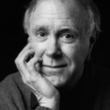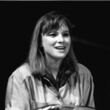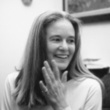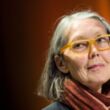Winter recipes from the collective
Description
WINNER OF THE NOBEL PRIZE IN LITERATUREA haunting book by a poet whose voice speaks of all our lifetimesLouise Glück’s thirteenth book is among her most haunting. Here as in the Wild Iris there is a chorus, but the speakers are entirely human, simultaneously spectral and ancient. Winter Recipes from the Collective is chamber music, an invitation into that privileged realm small enough for the individual instrument to make itself heard, dolente, its line sustained, carried, and then taken up by the next instrument, spirited, animoso, while at the same time being large enough to contain a whole lifetime, the inconceivable gifts and losses of old age, the little princesses rattling in the back of a car, an abandoned passport, the ingredients of an invigorating winter sandwich, a sister’s death, the joyful presence of the sun, its brightness measured by the darkness it casts. “Some of you will know what I mean,” the poet says, by which she means, some of you will follow me. Hers is the sustaining presence, the voice containing all our lifetimes, “all the worlds, each more beautiful than the last.” This magnificent book couldn’t have been written by anyone else, nor could it have been written by the poet at any other time in her life.
More Details
037460410
Subjects
Also in this Series
Published Reviews
Booklist Review
In her first new collection since being awarded the Nobel Prize for Literature in 2020, Glück returns to themes of mortality and nature; she also addresses ageing. In "The Denial of Death," a concierge, a spectral gentleman, addresses the abandoned narrator, "Do not be sad, he said. You have begun your own journey, / not into the world, like your friend's, but into yourself and your memories." Glück's work builds on an inquiring sense of wonder over our human experience and fortitude. If not for her tender, sometimes funny lines, one might mistake her for a pessimist. In "Night Thoughts," she images herself as an infant, "Was I a good baby? A / bad?" Thinking of the adults that were there then, "How hard it was / to be alive, no wonder / they all died." Glück's wryness is grounded in the common actuality of being. In "Song," the poet muses on a potter, "Leo thinks that things man makes / are more beautiful / than what exists in nature," to which her reply is, "and I say no. / And Leo says / wait and see." The Nobel committee praised the "austere beauty" of Glück's poems; this marvelous collection adds warmth and wit.
Publisher's Weekly Review
"Everything is change," Glück (Faithful and Virtuous Night) writes early in her quiet but powerful first work since being awarded the Nobel Prize for Literature in 2020. An overarching philosophy--"Also everything returns, but what returns is not/what went away"--drives the collection, with Glück's speaker standing at the precipice of great change, as though facing a coming winter. Glück considers a primary human loneliness in humane, reflective poems that are deeply engaged with the idea of being alone with oneself: "There is no one alive anymore/ who remembers me as a baby," Glück mourns. But as she looks back on her life----hard work, loss, some joy----she also looks forward. Not toward an afterlife, necessarily, but toward a place of peace: a "house in the distance, smoke is coming from its chimney." Death, these poems purport, is inevitable, but one need not be afraid: "All hope is lost," she claims; "We must return to where it was lost/ if we want to find it again." With this magnificent collection, a great poet delivers a treatise on how to live and die. (Oct.)
Library Journal Review
Bidart, whose multiple awards include a Pulitzer, tops off five decades of writing with a book arguing Against Silence in its embrace of the world.
Booklist Reviews
*Starred Review* In her first new collection since being awarded the Nobel Prize for Literature in 2020, Glück returns to themes of mortality and nature; she also addresses ageing. In The Denial of Death, a concierge, a spectral gentleman, addresses the abandoned narrator, "Do not be sad, he said. You have begun your own journey, / not into the world, like your friend's, but into yourself and your memories." Glück's work builds on an inquiring sense of wonder over our human experience and fortitude. If not for her tender, sometimes funny lines, one might mistake her for a pessimist. In Night Thoughts, she images herself as an infant, "Was I a good baby? A / bad?" Thinking of the adults that were there then, "How hard it was / to be alive, no wonder / they all died." Glück's wryness is grounded in the common actuality of being. In Song, the poet muses on a potter, "Leo thinks that things man makes / are more beautiful / than what exists in nature," to which her reply is, "and I say no. / And Leo says / wait and see." The Nobel committee praised the austere beauty" of Glück's poems; this marvelous collection adds warmth and wit. Copyright 2021 Booklist Reviews.
Library Journal Reviews
Recently appointed poetry editor at the Nation, Iranian American poet/scholar Akbar follows up his corrosively beautiful debut, Calling a Wolf a Wolf, with Pilgrim Bell, a courageous spiritual journey that captures the addict's ongoing struggle and the challenges of being Muslim in an Islamophobic nation. Bidart, whose multiple awards include a Pulitzer, tops off five decades of writing with a book arguing Against Silence in its embrace of the world. In Winter Recipes from the Collective, her first collection since winning the Nobel Prize, Glück joins voices together in a sort of chamber work to investigate loss, memory, and the quiet stride toward mortality (50,000-copy first printing). Former U.S. Poet Laureate, Smith offers her first retrospective with Such Color, selecting works from four previous volumes while continuing to push boundaries with her new poems. Andrew W. Mellon Director of the Smithsonian's National Museum of African American History and Culture, previously director of the Schomburg Center for Research in Black Culture, and poetry editor at The New Yorker, Young revisits places and people leaving holes in his life in Stones.
Copyright 2021 Library Journal.LJ Express Reviews
With her 13th collection, Nobel winner Glück (Faithful and Virtuous Night) returns to the spare, whispered lyrics for which she is known, poems that gently probe the borders of knowing ("we cannot be certain/ we have yet to experience the end") and express the simple but startling revelations that come with age ("There is no one alive anymore/ who remembers me as a baby"). They might take the form of curiously disembodied conversations—with a sister, friend, teacher—or of fairy tales peopled by real humans "waiting to be transformed" in ways that remain unknown, undefined. Fleetingly, sometimes wittily philosophical ("Insight, my sister says./ Now it is here./ But hard to see in the darkness"), Glück measures the weight of the external world against the interior's ("How heavy my mind is,/ filled with the past./ Is there room enough/ for the world to penetrate?") and—alas—finds it wanting: "And I say I'm glad I dream/ the fire is still alive." VERDICT Inherently reticent, like oysters opening ever so slowly, these poems are reluctant to display their pearls, but patient readers will discern an opalescence they may have missed on the first reading.—Fred Muratori, Cornell Univ. Lib., Ithaca, NY
Copyright 2021 LJExpress.





























